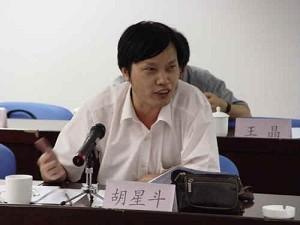The mainland Chinese media has reported that the prices of grain and cooking oils suddenly began to rise this past November. In Beijing, oils have risen 10 percent and the price of flour has increased by more than 10 percent. The price of grain and cooking oil in Shanghai, Guangdong and other areas has also gone up. These rising prices have caused changes for the costs and benefits of many industries, and this has caused rapid repercussions in the whole industrial chain.
A Epoch Times reporter interviewed Hu Xingdou, a professor at the Beijing Institute of Technology and an expert on Chinese issues. Professor Hu is the Vice Chairman of the International Business Management Research Institute at Beijing University; he is engaged in government economics, developmental economics and is involved in all kinds of research. The following is the content of the interview:
Reporter: What do you think about the situation of the recent increases in the costs of grain and cooking oils?
Hu Xingdou: Rising prices might be inevitable. The production cost of China’s agriculture is too high, and the modes of production are based mostly on small-peasant communities and individual farmers. The prices of China’s grains and other crops are higher than those on the international market; it is ten times higher than that in many developed countries.
The main reason for the high cost is because all agricultural means of production have been monopolized. The government assigns an enterprise to implement production. There is a lack of competition and as a result the prices for chemical fertilizers, seeds, agricultural machinery, water pumps, tractors, etc. are all very high.
In addition, farmers try to function as small businesses; they do not have large-scale production and as a result, the efficiency is very low. By looking at the nationwide situation, doing farm work is not a very profitable business. Because of the industrialization of agriculture, farmers can provide resources to enterprises but they are still in the vulnerable position. Due to the lack of an effective organization, it is impossible for those individual farmers to have a fair negotiation with those capitalists and entrepreneurs; they can only accept the other party’s prices passively.
Moreover, to increase food production, use more technology to scale operation, or engage in other agricultural production requires large amounts of capital which the farmers have no way to get at present. Government-owned corporations are not giving loans to the farmers. Of the farmers’ funds, 70 percent are received through underground financial channels or loans from families and good friends or loan sharks. So the countryside is in a situation similar to a financial black hole, there is no way for them to do large-scale production and/or marketing. This is also the reason for the high cost of food.
Reporter: In your opinion, how can they step out from this trap?
Hu Xingdou: Reformation needs to be done from many aspects. The first step is eliminating the government’s monopoly on agricultural production and by creating multiple private enterprises with various forms of ownerships. Free enterprise needs to be promoted to create a situation of competitive production.
The government should not fight for benefits with the public; neither should it be involved in agricultural production or operation. Instead, it should be mainly responsible for the supervision of the quality of agricultural production. In this way, all enterprises can lower the price of agricultural production through competition; and they can also reduce the costs of marketing through a non-exclusive channel.
Besides, China’s countryside should be encouraged to set up agricultural associations, agricultural professional associations, peasants’ unions, etc. to let farmers organize to better facilitate production and external sales. Peasants’ unions can also increase funding through savings or shared marketing and stock options, playing the role of a credit agency; this will solve the problem of financial turmoil.
Reporter: Do you think that the type of reform you just mentioned can be implemented in the present China? The farmers of Taizhou, Zhejiang Province had applied for establishing a Farmer’s Union but met suppression from the government.
Hu Xingdou: If the central government has no wish to reform, then nothing can be done. To eradicate the monopolization on agricultural capital, which involves vested interests among different groups, requires the determination of the central government.
The local officials’ worst fear is for farmers to organize. Although it is only an organization to promote profit and technology, the authorities are afraid of being responsible for any possible political threats. Therefore, many of them are not supportive of farmers’ associations and even oppress them in secret.
Reporter: Did the relief of the agricultural tax and the special produce tax improve the situation for farmers?
Hu Xingdou: Although the central government lifted these taxes and it appears that Chinese farmers are not taxed, they in fact still have to pay a large portion. A vice commissioner from the National Tax Bureau disclosed that 60-70 percent of China’s tax revenue comes from farmers. This is primarily from the farmers having to pay high prices for agricultural resources. The produce they sell is relatively cheap, but the production process is very expensive.
Even though the central government has begun to invest more in agriculture, the funds are insufficient to make any pronounced changes. In fact, farmers receive little benefit from this policy. A large portion of the funds are pocketed by local governments and not much is left to improve the lives of farmers. In the end, more money has been extracted from farmers than they are being subsidized. Hundreds of billion yuan (approximately US $ hundreds of million) are being taken from the countryside each year for use in industrial or urban construction.
Reporter: With the rise in produce prices, will farmers receive more benefits?
Hu Xingdou: Not necessarily. The farmers may even be worse off. A year of hard work may come to be nothing. The reason being is that the cost of production is too high and the sales channels are not fully developed. Hence the farmers’ increase in yield does not bring them additional income. Due to the lack of a farmer’s union and other institutions, the produce can only be sold to the government or at small markets. Since it is difficult to sell at bulk in small markets, most of the produce is sold to the government at a low cost.
Reporter: Then who is making a profit from the increase in prices?
Hu Xingdou: It is likely the producers of agricultural resources, administrators and sales personnel of the agricultural channel that are reaping the most benefit. These people are either government officials or belong to vested interest groups under government protection. They are the biggest winners, whereas the farmers do well with not losing their principal.
According to scientific computations, agricultural production in past years has been losing money. The investment to output of farmers is approximately 1.1 to 1. In recent years, with the relief of the agricultural tax and the special produce tax, many people feel that farmers are doing better. However, this has been counterbalanced by the rise in prices for chemical fertilizers and pesticides. Hence agricultural production in China is still facing a huge hurdle.
Reporter: Agricultural produce is a basic commodity. If the prices rise, then other commodities will become more expensive as well. Some experts fear that this will lead to inflation. What is your take on this issue?
Hu Xingdou: It is possible. Agriculture accounts for 30-40 percent of the raw materials in various industries. The rise in prices of these raw materials may lead to a comprehensive increase in industrial production principals and inflation. According to past experiences, the increase in the price of grain is the main cause of inflation. Of course, inflation is not solely due to agriculture but also relates to the prices of various raw materials.
In fact, China has always been presented with a temperate inflation, which is likely investment driven and not production driven. This is mainly caused by the government’s massive investment in “achievement projects” to create superficial prosperity, which then leads to escalating prices in real estate, etc.



